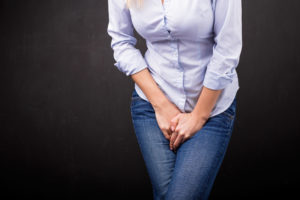What is urge incontinence?
Urge incontinence is the involuntary loss of urine that occurs suddenly. In fact, the urge to urinate can be so strong, that the individual may not be able to reach a restroom in time. This is especially problematic if the person has mobility problems due to a health issue, functional restrictions or age. Urologists routinely evaluate patients who are experiencing urge incontinence. Oftentimes, conservative options such a behavioral changes, bladder training, and medications, can make a positive and long-lasting impact for people with urge incontinence.
Stress incontinence occurs when a ‘stressor’ triggers urinary leakage. These stressors may include coughing, laughing, or sneezing. Urge incontinence is unlike stress incontinence because it occurs without an easily identifiable reason.
Urge incontinence symptoms
There are several factors that differentiate urge incontinence from other types of urinary incontinence. These factors include:
- Urgency – A strong and sudden need to urinate.
- Frequency – The need to urinate more than eight time a day.
- Nocturia – The need to urinate several time during the night.
- Unpredictable – Urinary incontinence is unpredictable and doesn’t appear to be associated with a specific stressor.
- Amount of urine – Individuals with urge incontinence generally lose large amounts of urine rather than the small leaks associated with stress incontinence.
- Pad use – Individuals with urge incontinence tend to use a large number of pads to control wetting on themselves.
Urge incontinence causes
There are several factors that may have an influence on urge incontinence. Some of these factors include:
- Alcohol consumption.
- Drinking beverages with caffeine.
- Drinking carbonated beverages.
- Liquid intake during a short period of time.
- Enlarged prostate in men.
- Spicy foods.
- Sugar or artificial sweetners.
- Ignoring the initial urge to urine.
- Sedentary lifestyle.
- Some neurological disorders.
Evaluation
Whenever an individual is experiencing a sudden urge to urinate, or have a recurrent, unexplained lose of urine, they should contact a urologist. During their initial visit, the urologist will review their medical history, conduct a physical examination, evaluate their symptoms, and perform a urinalysis. The urologist will oftentimes request that the patient complete a voiding diary over the course of three to seven days. This diary will capture their fluid intake, their urine output, and how much urine they produce. The urologist may also conduct additional tests to help identify the cause of urine loss. These tests may include:
- Urine culture
- Bladder ultrasound
- Urodynamics – The evaluation of how the bladder stores and empties urine. This test is performed in-office during a separate office visit.
Treatment options
Based on the patient’s evaluation and test results, the urologist will be able to recommend several treatment options for help control or eliminate the sudden urge to urinate. These options range from conservative to surgical options including:
- Behavioral / lifestyle modifications.
- Dietary modifications or restrictions.
- Timed voiding and double voiding.
- Medications.
- Botox injections in the bladder.
- Percutaneous Tibial Nerve Stimulation (PTNS).
- InterStim Therapy.
- Surgical options.
The sudden loss of urine can be distressing and impact an individual’s quality of life. If you are experiencing the loss of urine, contact Urology Austin to schedule an appointment with any of our urologists.

